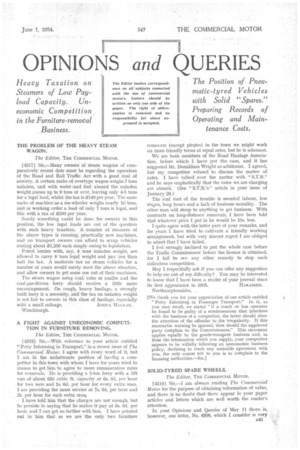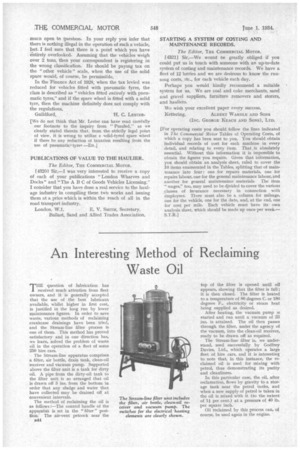OPINIONS and QUERIES
Page 61

Page 62

If you've noticed an error in this article please click here to report it so we can fix it.
THE PROBLEM OF THE HEAVY STEAM WAGON:
The Editor, THE COMMERCIAL MOTOR.
[43171 Sir,—Many owners of steam wagons of comparatively recent date must be regarding the operation of the Road and Rail Traffic Act with a good deal of anxiety. A certain make of overtype wagon weighs 7 tons unladen, and with water .and fuel aboard the unladen weight comes up to 9 tons or over, leaving only 4-5 tons for a legal load, whilst the tax is £140 per year. The same make of machine as a six-wheeler weighs nearly 10 tons, and in Working order a load of only 7 tons is legal, and this with a tax of 200 per year.
Surely something could be done for owners in this position, the low legal loads are out of the question with such heavy taxation. A number of steamers of the above types is running, practically new machines, and no transport owners can afford to scrap vehicles costing about £1,200 each simply owing to legislation.
Petrol lorries with, say, 4 tons unladen weight, are allowed to carry 8 tons legal weight and pay less than half the tax. A moderate tax on steam vehicles for a number of years would surely meet the above situation, and allow owners to get some use out of their machines.
The steam wagon using coal, coke or coalite and the coal-gas-driven lorry should receive a little more encouragement. On rough, heavy haulage, a strongly built lorry is a necessity, and the tax on unladen weight is not fair to owners in this class of haulage, especially with a small mileage. ANGT:S MACKAY. Winchburgh.
A FIGHT AGAINST UNECONOMIC COMPETITION IN FURNITURE REMOVING.
The Editor, THE COMMERCIAL MOTOR.
[4318] Sir,—With reference to your article entitled "Petty Informing in Transport," in a recent issue of The Commercial Motor, I agree with every word of it, but I am in the unfortunate position of havilig a competitor in this town with whom I have for years tried to reason to get him to agree to more remunerative rates for removals. He is providing a 5-ton lorry with a lift van of about 650 cubic ft. capacity at Gs. &I. per hour for two men and 1s. Gd. per hour for every extra man. I am providing the same service at 7s. 6d. per hour and 2s. per hour for each extra man.,
I have told him that the charges are not enough, but be persists in saying that he makes it pay at Gs. 6d, per hour, and I can get no farther with him. I have pointed out to him that as we are the only two furniture removers (except pirates) in the town we might work on more friendly terms at equal rates, but he is adamant.
We are both members of the Road Haulage Association, before which I have put the case, and it has suggested Mr. Donaldson Wright as arbitrator. I agreed, but my competitor refused to discuss the matter of rates. I have talked over the matter with " S.T.R." and he says emphatically that the rates we are charging are absurd. (See " S.T.R.'s " article in your issue of January 26.) , The real root of the trouble is sweated labour, low viages, long hours and a laCk of business morality. The other man will stoop to anything to get business. With contracts on long-distance removals, I have been told that whatever price I put in he would be 10s. less.
I quite agree with the latter part of your remarks, and for years I have tried to cultivate a friendly working arrangement, but with very sincere regret I am obliged to admit that I have failed.
I feel strongly inclined to put the whole case before the Traffic Commissioner before the licence is obtained,
for I fail to see any other remedy to stop such ridiculous competition.
May I respectfully ask if you can offer any suggestion to help me out of my difficulty? You may be interested to know that I have been a reader of your journal since
its first appearance in 1905. HARASSED. Northamptonshire. .
[We thank you for your appreciation of our article entitled "Petty Informing in Passenger Transport." In it, as you may recall, we stated " if a coach or bus operator be found to be guilty of a misdemeanour that interferes with the business of a competitor, the latter should draw the attention of the offender to the irregularity. If this reasonable warning be ignored, then should the aggrieved party complain to the Commissioners." This statement applies equally to the goods-transport business and, as from the information which you supply, your competitor appears to be wilfully following an uneconomic business policy, declining to reach any amicable agreement with you, the only course left to you is to complain to the licensing authorities.—En.]
SOLID-TYRED SPARE WHEELS,
The Editor, THE COMMERCIAL MOTOR.
[4319] Sir,—I am always reading The Commercial Motor for the purpose of obtaining information of value,
and there is no doubt thatthere appear in your paper articles and letters which are well worth the reader's attention.
In your Opinions and Queries of May 11 there is, however, one letter, No. 4308. which I consider is very mud ti open to question. In your reply you infer that there is nothing illegal in the operation of such a vehicle, but. I feel sure that there is a point which you have entirely overlooked. Assuming that the vehicles weigh over 2 tons, then your correspondent is registering in the wrong classification. He should be paying tax on the "other vehicle" scale, when the use of the solid spare would, of course, be permissible.
In the Finance Act of 1928, when the tax levied was reduced for vehicles fitted with pneumatic tyres, the class is described as "vehicles fitted entirely with pneumatic tyres," and if the spare wheel is fitted with a solid tyre, then the machine definitely does.not comply with the regulations.
Guildford. II. C. LESTER.
[We do not think that Mr. Lester can have read carefully our footnote to the inquiry from " Puzzled," as we clearly stated therein that, from the strictly legal point of view, it is wrong to utilize a solid-tyred spare wheel if there be any reduction of taxation resulting from the use of pneumatici tyres —En.] PUBLICATIONS OF VALUE TO THE HAULIER.
The Editor, THE COMMERCIAL MOTOR.
143201 Sir,—I was very interested to receive a copy Of each of your publications "London Wharves and Docks" and "The A B C of Goods Vehicles Licensing." I consider that you have done a real service to the haulage industry in compiling these twb works and issuing them at a price which is within the reach of all in the road transport industry.
London, W.1. E. V. SMITH, Secretary. Ballast, Sand and Allied Trades Association. STARTING A SYSTEM OF COSTING AND MAINTENANCE RECORDS.
The Editor, THE COMMERCIAL MOTOR.
[4321] Sir,—We would be greatly obliged if you could put us in touch with someone with an up-to-date system of costing and maintenance records. We have a fleet of 12 lorries and we are desirous to know the running costs,. atc., for each vehicle each day.
Perhaps you would kindly recommend a suitable system for us. We are coal and coke merchants, sand and gravel suppliers, furniture removers and storers, and hauliers.
We wish your excellent paper every success.
Kettering. . ALBERT WARDLE AND SONS (INC. GEORGE KEACH AND SONS), LTD.
[For operating costs you should follow the lines indicated in The Commercial Motor Tables of Operating Costs, of which a copy has been sent to you. You should obtain individual records of cost for each machine in every detail, and relating to every item. That is absolutely essential. Without this information it is impossible to obtain the figures you require. Given that information, you should obtain an analysis sheet, ruled to cover the 10 items enumerated in the Tables, splitting that of maintenance into four : one for repairs materials, one for repairs labour, one for the general maintenance labour, and another for general maintenance materials. The item "wages," too, may need to be divided to cover the various classes of insurance necessary in connection with employees. Tf:ere must also be a column for mileage. one for the vehicle, one for the date, and, at the end, one for cost per mile. Each vehicle must have its own analysis sheet, which should be made up once per week.-S.T.R.1




































































































